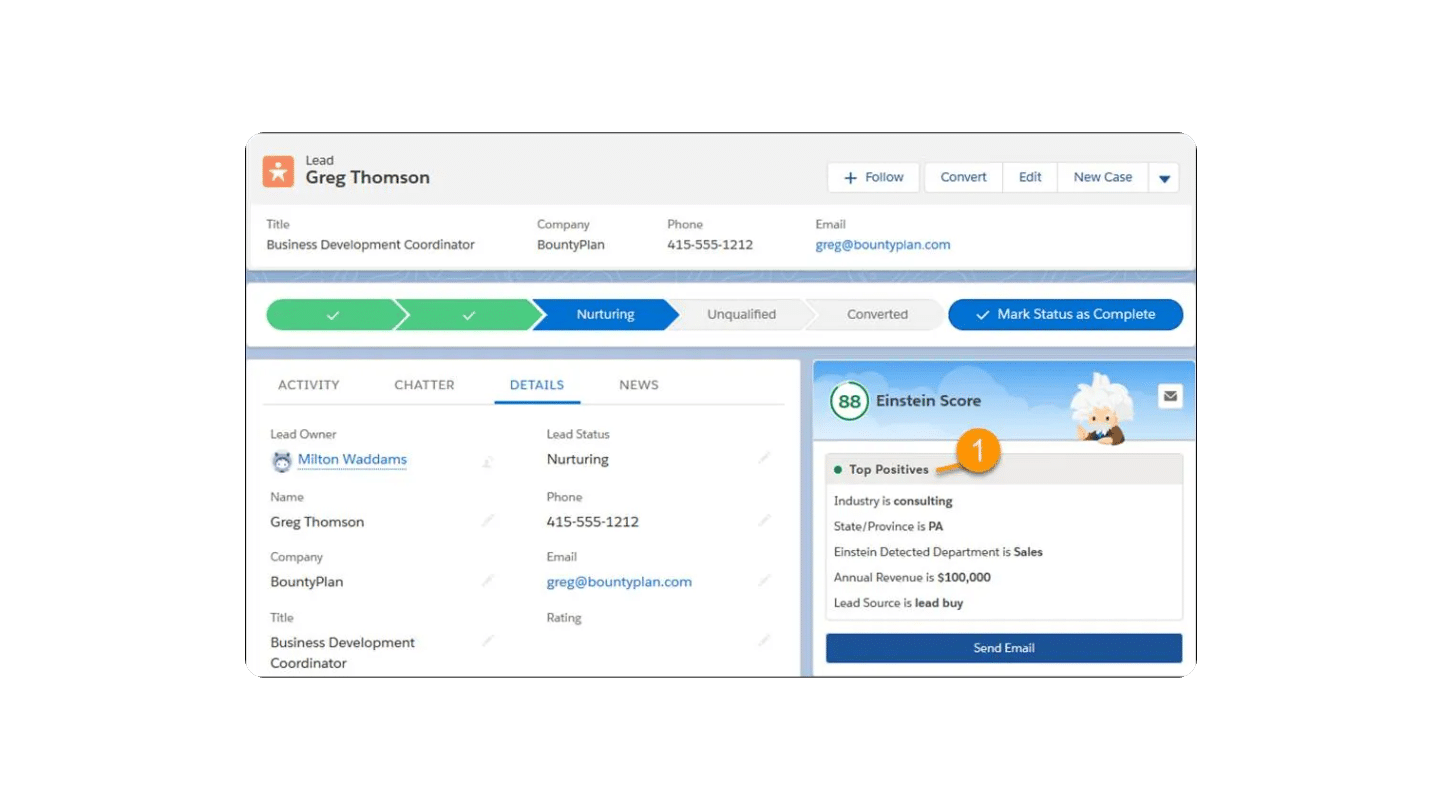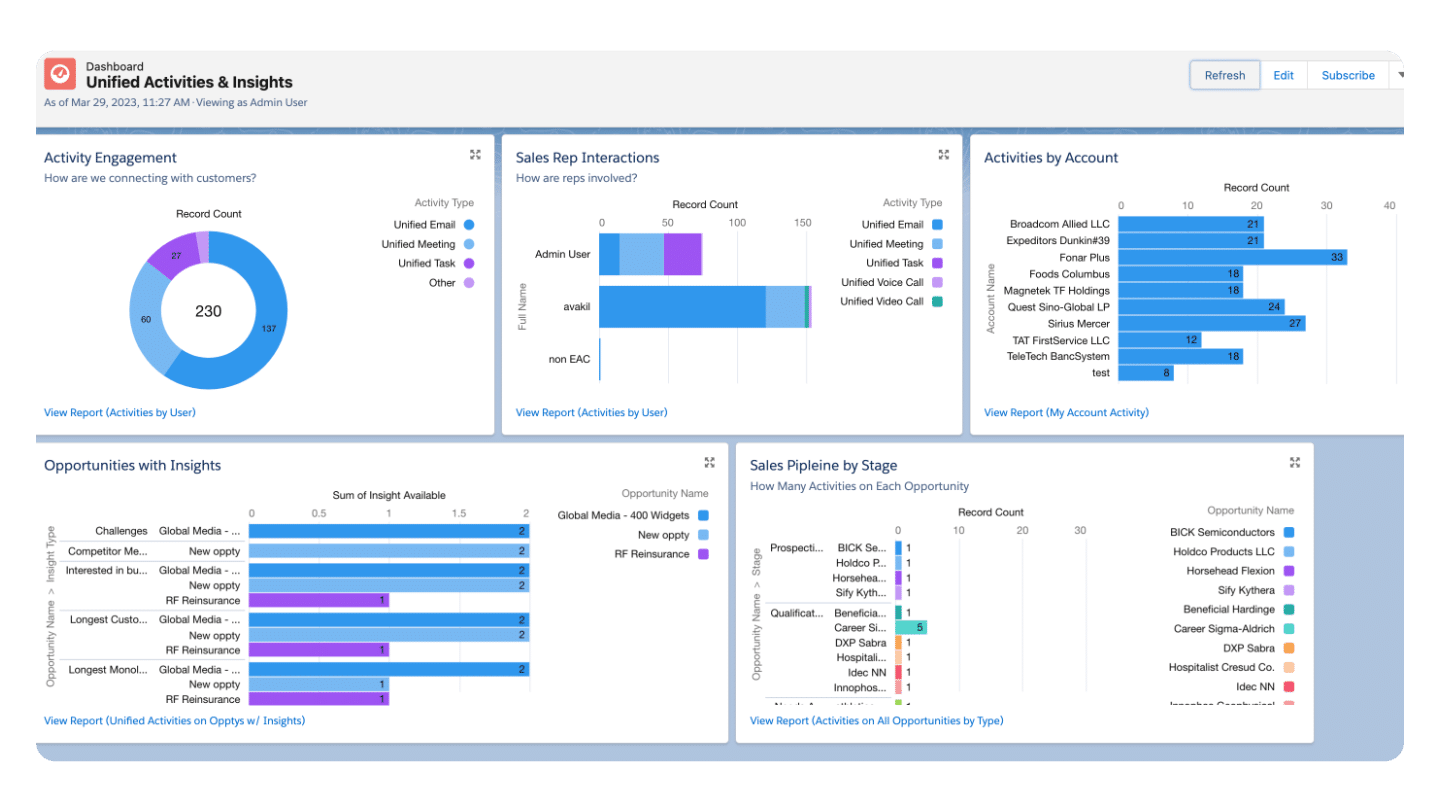Many companies are aware of the potential of Artificial Intelligence (AI) to optimize B2B sales processes. So much the better!
But while many have already experimented with AI solutions, few companies have truly structured and industrialized their approach. AI is still largely at an exploratory, or even “do-it-yourself” stage, without translating into rational integration into the workings of the sales organization.
And yet, from sales prediction to reporting automation, product recommendation and tour optimization, the use cases for AI are numerous and touch every facet of the B2B sales business.
This article offers an overview of 9 concrete applications of AI, 9 avenues for moving from a logic of experimentation to a true industrialization of AI in the sales function.
Sommaire
#1 Using AI to predict sales
Predictive intelligence is one of the major fields of application for AI. With advances in artificial intelligence, it is becoming possible to predict sales with an increasingly satisfactory level of accuracy.
The principle is simple: by analyzing sales history, customer behavior and many other signals from the data, AI is able to detect recurring patterns and extract predictive trends. Applied to company data, these models provide fairly reliable projections of future business results, both in the short and medium term.
The benefits for sales teams and management are manifold. This makes it possible, for example, to adapt sales tactics in line with forecasts, optimize resource allocation, identify high-risk deals…
Solutions like Salesforce’s Sales Cloud natively integrate these predictive analysis functions, based on the CRM giant’s in-house AI: Einstein AI. But, of course, most CRM software packages have jumped on the AI bandwagon.
#2 Implement dynamic pricing with AI
How do you ensure that the price you quote is always the right one, the one that maximizes sales without squeezing margins? Here again, AI can help.
AI-based dynamic pricing algorithms are able to analyze in real time a multitude of factors that influence the purchasing decision: the customer’s profile, transaction history, demand for the product, competitors’ prices…
Based on this data, they recommend the best price for each transaction, and even automatically adjust prices on digital channels.
The result: continuously optimized pricing that adapts to every customer and every situation. This enables companies to gain in competitiveness while preserving their margins. Sales staff can focus on customer relations, supported by intelligent pricing recommendations.
#3 AI for customer segmentation
AI can also be used in B2B sales to generate finer, more relevant customer segmentation.
How do you do it? Once again, thanks to data and large-scale analysis. Artificial intelligence makes it possible to analyze vast volumes of customer data, going beyond the traditional and sometimes basic criteria used in segmentation. Purchasing behaviors, digital interactions, reactions to campaigns: every signal is analyzed to detect subtle similarities between customers, and reveal high-value segments or “micro-segments”.
AI paves the way for hyper-segmentation and ultra-personalized sales approaches. Hyper-segmentation makes hyper-targeting possible, enabling companies to optimize the effectiveness of their actions and develop more relevant relationships with each customer.
Discover Salesforce AI for free
Today, Salesforce is the CRM with the most artificial intelligence-based B2B sales functionalities. All the use cases presented in this article are managed by “Einstein”, the name of Salesforce’s AI. Want to know more about Salesforce’s AI capabilities? The publisher offers a free demo.
#4 Using artificial intelligence for lead scoring
Not all leads are created equal. That’s why it’s so important for sales forces to quickly qualify them and prioritize actions. Problem: with the multiplication of interaction channels, it’s becoming difficult to have an exhaustive view of each lead. How to find your way around?
AI provides an effective response with next-generation lead scoring models. Their principle: automated analysis of a broad spectrum of data on each lead (demographics, firmographics, online behavior, engagement…) to assess their level of engagement and propensity to buy in real time.

Each lead is assigned a predictive score that objectively reflects its potential “value”. Lead scoring enables sales teams to concentrate their efforts on the hottest prospects, those who require rapid action.
#5 AI chatbots, the new sales assistants
Chatbots have made huge strides in recent years thanks to artificial intelligence.
As you probably already know, these conversational agents use automatic natural language processing (ANLP) and machine learning technologies to analyze customer messages, capture context and intent, and then build tailored responses by drawing on a knowledge base. It’s all fluid and instantaneous, just like a natural conversation.
The use cases for chatbots in B2B sales and CRM are numerous: product support, appointment setting, lead qualification, personalized recommendations…
Chatbots can help automate a number of tedious tasks. Not only do they free up valuable time for sales teams, but they also help to improve the customer experience, by offering 24/7 service and immediate responses.
Go further on AI applied to CRM / B2B Sales
#6 AI to optimize sales rounds and schedules
For traveling sales reps, optimizing routes is one of the biggest challenges. How can you organize your travel efficiently, taking into account business priorities and time constraints? A complex problem, where AI can make all the difference.
AI-based tour optimization solutions rely on advanced algorithms capable of processing a multitude of parameters in a matter of seconds: customer location, appointment priority, distances, travel times, sales rep availability, etc. All this data is cross-referenced to generate the optimal schedule, one that maximizes the number of visits while minimizing travel times.
For sales staff, this means a significant gain in efficiency, enabling them to concentrate on customer relations rather than logistics. It’s also a lever for sales performance, since it allows us to see more customers and seize more opportunities.
#7 Use AI for personalized product recommendations
Product recommendation is one of the major ways of personalizing sales relationships. Helping customers find the right product is not just a B2C issue, it’s also true for B2B, of course.
That’s where AI recommendation engines come in. Their mission is to analyze each customer’s behavior and preferences to suggest the most relevant products at the right time.
How do you do it? Here again, we rely on machine learning algorithms capable of processing vast volumes of customer data: purchase history, browsing behavior, interactions with the brand…These data are all signals that enable us to draw up a precise profile of customer tastes and needs.
Armed with this knowledge, the system can then generate ultra-personalized recommendations, whether for complementary products, new categories or targeted promotions. All automated and on a large scale, across all points of contact: website, mobile application, email…
Major CRM players (starting with Salesforce) are now integrating these technologies into their solutions, whether for B2C or B2B sales.
Discover Salesforce AI for free
Today, Salesforce is the CRM with the most artificial intelligence-based B2B sales functionalities. All the use cases presented in this article are managed by “Einstein”, the name of Salesforce’s AI. Want to know more about Salesforce’s AI capabilities? The publisher offers a free demo.
#8 AI at the service of customer knowledge
Knowing your customers is a prerequisite for any effective sales strategy. But with the multiplication of interaction channels and data sources, it’s becoming difficult to have a unified vision of each customer. This is where AI can help companies turn a corner in customer knowledge management.
AI-based Customer Intelligence solutions are capable of collecting and analyzing customer data from multiple sources: CRM, customer service, social networks, surveys…
Every interaction, every feedback is transformed into actionable insight.
AI makes it possible to consolidate all this information to build a 360° view of each customer, with a detailed understanding of their profile, preferences, irritants…
This use case comes as no surprise: AI is first and foremost about data analysis. Which brings us to the last use case in this selection.
#9 AI takes sales reporting to a new level
Reporting is often seen as a time-consuming task for salespeople and their managers. Data collection, consolidation, analysis, etc. So much time spent away from the field and customers.
With AI, it’s possible to automate much of this work, while improving its relevance.

AI-based reporting solutions perform a complete analysis of the data available from your source systems (starting with CRM) to
- Provide a unified view of sales performance.
- Answer sales representatives’ questions, in the form of conversational assistants.
The result: more complete, more reliable and, above all, more actionable sales reports. Every salesperson and manager receives personalized insights based on their objectives and scope, which in turn helps them to make better, faster decisions. AI becomes like a co-pilot at the service of sales efficiency.
Artificial intelligence can go even further, detecting key trends, opportunities and risks…which brings us back to the first use case for AI in B2B sales presented in this article. We’ve come full circle. This selection is just a small sample of how AI can help improve B2B sales and CRM processes. The AI revolution, here as elsewhere, is still in its infancy.
Discover Salesforce AI for free
Today, Salesforce is the CRM with the most artificial intelligence-based B2B sales functionalities. All the use cases presented in this article are managed by “Einstein”, the name of Salesforce’s AI. Want to know more about Salesforce’s AI capabilities? The publisher offers a free demo.





